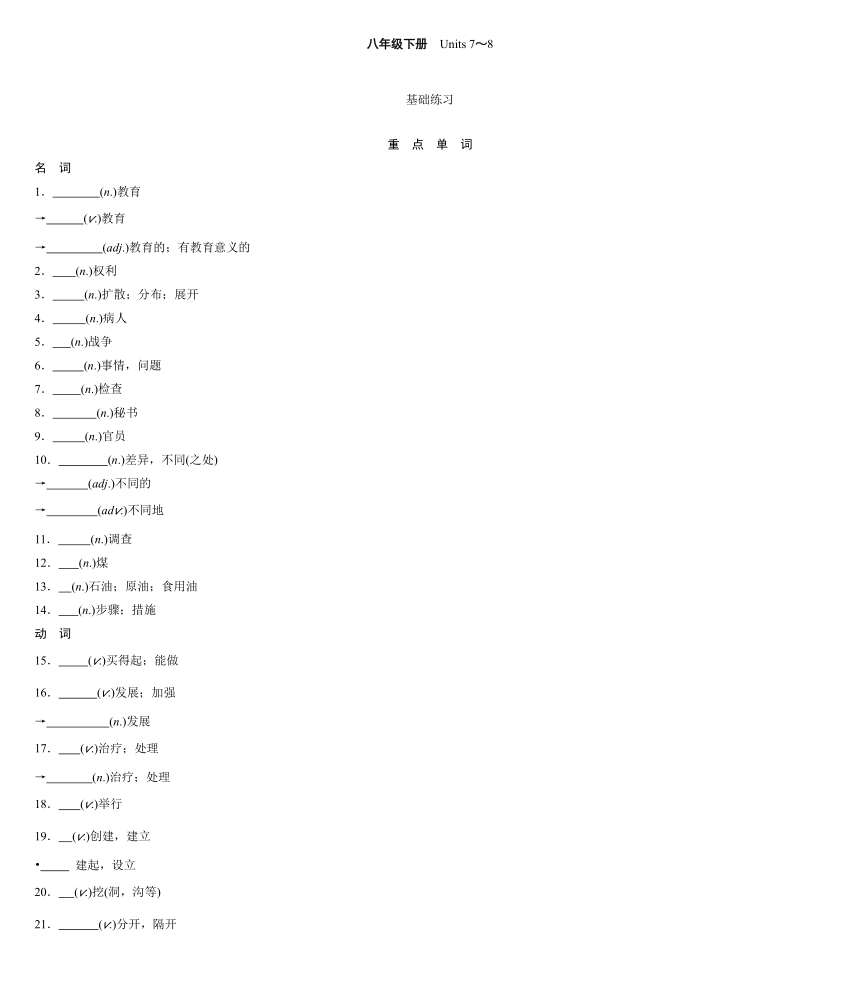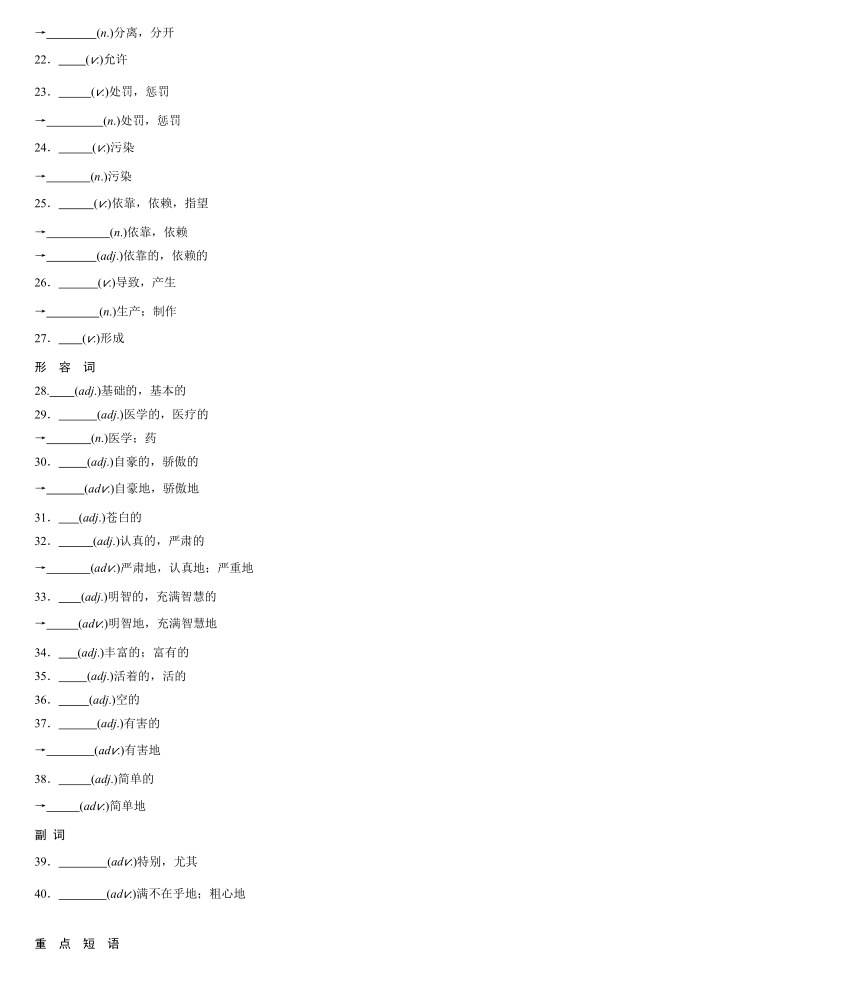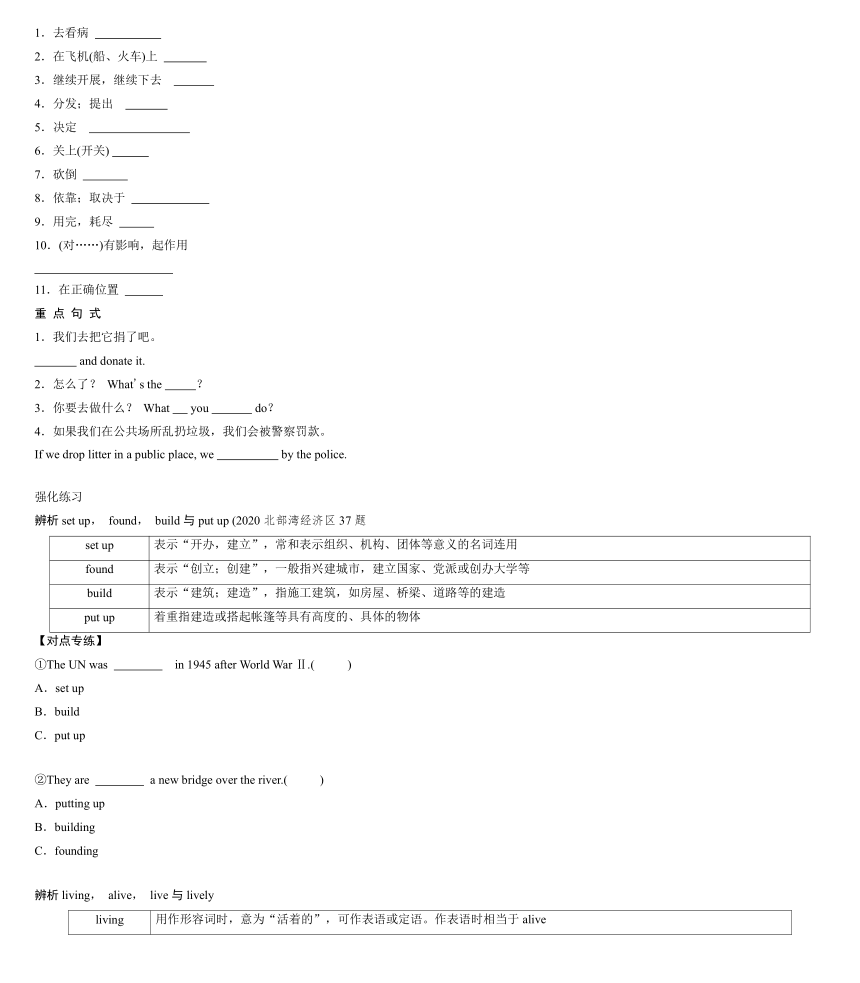八年级下册Units 7~8 课后练习 2024年广西英语译林版中考总复习(含答案)
文档属性
| 名称 | 八年级下册Units 7~8 课后练习 2024年广西英语译林版中考总复习(含答案) |  | |
| 格式 | docx | ||
| 文件大小 | 28.8KB | ||
| 资源类型 | 教案 | ||
| 版本资源 | 牛津译林版 | ||
| 科目 | 英语 | ||
| 更新时间 | 2024-05-21 19:24:28 | ||
图片预览



文档简介
八年级下册 Units 7~8
基础练习
重 点 单 词
名 词
1.education(n.)教育
→educate(v.)教育
→educational(adj.)教育的;有教育意义的
2.right(n.)权利
3.spread(n.)扩散;分布;展开
4.patient(n.)病人
5.war(n.)战争
6.matter(n.)事情,问题
7.check(n.)检查
8.secretary(n.)秘书
9.officer(n.)官员
10.difference(n.)差异,不同(之处)
→different(adj.)不同的
→differently(adv.)不同地
11.survey(n.)调查
12.coal(n.)煤
13.oil(n.)石油;原油;食用油
14.step(n.)步骤;措施
动 词
15.afford(v.)买得起;能做
16.develop(v.)发展;加强
→development(n.)发展
17.treat(v.)治疗;处理
→treatment(n.)治疗;处理
18.hold(v.)举行
19.set(v.)创建,建立
set up 建起,设立
20.dig(v.)挖(洞,沟等)
21.separate(v.)分开,隔开
→separation(n.)分离,分开
22.allow(v.)允许
23.punish(v.)处罚,惩罚
→punishment(n.)处罚,惩罚
24.pollute(v.)污染
→pollution(n.)污染
25.depend(v.)依靠,依赖,指望
→ dependence(n.)依靠,依赖
→dependent(adj.)依靠的,依赖的
26.produce(v.)导致,产生
→production(n.)生产;制作
27.form(v.)形成
形 容 词
28.basic(adj.)基础的,基本的
29.medical(adj.)医学的,医疗的
→medicine(n.)医学;药
30.proud(adj.)自豪的,骄傲的
→proudly(adv.)自豪地,骄傲地
31.pale(adj.)苍白的
32.serious(adj.)认真的,严肃的
→seriously(adv.)严肃地,认真地;严重地
33.wise(adj.)明智的,充满智慧的
→wisely(adv.)明智地,充满智慧地
34.rich(adj.)丰富的;富有的
35.living(adj.)活着的,活的
36.empty(adj.)空的
37.harmful(adj.)有害的
→harmfully(adv.)有害地
38.simple(adj.)简单的
→simply(adv.)简单地
副 词
39.especially(adv.)特别,尤其
40.carelessly(adv.)满不在乎地;粗心地
重 点 短 语
1.去看病 go to hospital
2.在飞机(船、火车)上 on board
3.继续开展,继续下去 carry on
4.分发;提出 hand out
5.决定 make up one's mind
6.关上(开关) turn off
7.砍倒 cut down
8.依靠;取决于 depend on/upon
9.用完,耗尽 run out
10.(对……)有影响,起作用
make a difference (to sb/sth)
11.在正确位置 in place
重 点 句 式
1.我们去把它捐了吧。
Let's go and donate it.
2.怎么了? What's the matter?
3.你要去做什么? What are you going to do?
4.如果我们在公共场所乱扔垃圾,我们会被警察罚款。
If we drop litter in a public place, we will be fined by the police.
强化练习
辨析set up, found, build与put up (2020北部湾经济区37题
set up 表示“开办,建立”,常和表示组织、机构、团体等意义的名词连用
found 表示“创立;创建”,一般指兴建城市,建立国家、党派或创办大学等
build 表示“建筑;建造”,指施工建筑,如房屋、桥梁、道路等的建造
put up 着重指建造或搭起帐篷等具有高度的、具体的物体
【对点专练】
①The UN was in 1945 after World War Ⅱ.( A )
A.set up
B.build
C.put up
②They are a new bridge over the river.( B )
A.putting up
B.building
C.founding
辨析living, alive, live与lively
living 用作形容词时,意为“活着的”,可作表语或定语。作表语时相当于alive
alive 形容词,意为“活着的,在世的”,常作表语,既可以修饰人也可以修饰物;也可作后置定语
live 用作形容词时,意为“现场直播的;活的”;用作不及物动词时,意为“居住”,后接地点名词时要加in/at
lively 形容词,意为“生动的,活泼的,充满生气的”,用作表语或定语,可用来修饰人或物
【对点专练】
living alive live lively
①He was alive when he was taken to hospital.
②The teacher always makes his lessons lively.
③All living things need water, air and sunlight.
④Did you watch the live football match on TV?
辨析be afraid of doing sth与be afraid to do sth (2021北部湾经济区45题)
be afraid of doing sth 表示担心会发生某事或某种情况(但实际上未必会发生),或不敢做某事(指害怕其后果而不敢做)
be afraid to do sth 指按照经验或常识不敢去做某事,或没有勇气去做某事(表示事情还未发生)
【对点专练】
I'm afraid English before so many people because I'm afraid mistakes.( C )
A.of speaking; to make
B.to speak; to make
C.to speak; of making
语法练习
被动语态(2020北部湾经济区39题)
( B )1.(2023成都)A great number of beautiful flowers on the second ring road in Chengdu these days.
A.plant
B.are planted
C.are planting
( C )2.(2023滨州改编)—Can he get the first prize in the race
—He so, but he has just hurt his leg. It's impossible now.
A.will expect to do
B.is expected doing
C.was expected to do
( A )3.(2023达州)—Would you mind telling me if he the meeting in two days
—He won't, unless he .
A.will attend; is invited
B.attends; will be invited
C.will attend; invites
( C )4.(2023兰州改编)No matter how many difficulties we meet, we believe all problems .
A.are solved
B.were solved
C.will be solved
写出下列黑体单词的熟义并根据语境选出最佳生义。
1.treat
熟义:(v.)对待
(n.)招待
生义:A.(v.)把……看作/视为
B.(v.)治疗;处理
( B )(1)The condition is usually treated with drugs and a strict diet.
( A )(2)The old man treated him as his own son.
2.hold
熟义:(v.)①抓住,拿着 ②保留
③容纳
生义:A.(v.)控制
B.(v.)保持
( B )(1)I fear that the fine weather won't hold much longer.
( A )(2)He has been trying hard to hold his temper(脾气).
提能练习
一、根据语境或提示,完成句子。
1.He likes playing ball games, especially(尤其) football.
2.Mr. Chen had a long talk with the interviewer(采访者).
3.He has caught a bad cold, so his face looks pale.
4.Eating too much sugar is harmful to your teeth.
5.These new types of energy can produce(产生) little pollution.
二、用括号内所给单词的适当形式填空。
1.The old person gets medical(medicine) care in the health centre once a week.
2.Playing computer games too much may lead to blindness(blind).
3.Those who drive cars after drinking will be punished(punish) seriously.
4.Children should be taught to spend their free time wisely(wise).
5.There are some differences(different) between British English and American English.
三、小语篇特训。(教材链接:译林版八年级下册Unit 7 Task B改编)
programme travel problem afraid attend
Diana was once a secretary of a big company. She lived in a comfortable flat and drove to work. She travelled to many places, but she seldom took the plane. She was 1.afraid of flying.
One day, Diana saw a TV 2.programme about ORBIS. She learnt about the Flying Eye Hospital. She wanted to help poor people with eye 3.problems see again, so she made up her mind to train as a nurse and 4.attended courses after work.
Diana is working for ORBIS now. She has to travel over 300 days a year. She is getting used to 5.travelling by plane.
Diana enjoys her work. She is glad to be able to help people see again. She does not have as much money as before, but she thinks her life is more meaningful.
阅读理解(2023江西改编)
A Bright Idea
Evans Wadongo was from a village of Africa. He had to do homework by the light of a kerosene lamp(煤油灯). Evans' eyes hurt and this made studying difficult. Many children left school for this reason, so they remained poor for the rest of their lives.
Although studying was difficult, Evans was an excellent student and went to a university. He continued to worry about the kerosene lamp. By this time, he realized it was not just bad for schoolchildren but for the whole family. It was difficult to come up with a different kind of lamp that was cheap and good for the environment. Yet Evans did not give up.
One day, he had an idea. He could use a small solar(太阳能的) light. Sunlight is free and solar power is good for the environment. Evans built his first solar lamp, and it worked. He began to build more lamps and sent them to local families. An organization provided money for him to build more solar lamps.
Each lamp only cost $20. However, this was a lot of money to many villagers, who only earned around $34 a week, so Evans kept the cost down. First, Evans used recycled materials. Next, volunteers built the lamps. Finally, people from many countries gave away money to his team, so the lamps were usually free.
Thousands of people had safe light. Julia, a mother of three, said, “Thanks to Evans, my children have light to read, and I have my own light to cook.” The solar lamps made a big difference.
( C )1.What does the underlined word “this” in Paragraph 1 refer to
A.Leaving school.
B.Doing homework.
C.Having eye problems.
( A )2.How much did villagers usually pay for solar lamps
A.For free.
B.$20.
C.$34.
( A )3.Which is the correct order according to the passage
a.Evans went to a university.
b.Thousands of people had safe light.
c.His first solar lamp was invented.
d.Kerosene lamps hurt Evans' eyes.
e.Recycled materials were used in the lamps.
f.People from many countries gave away money.
A.d-a-c-e-f-b
B.d-f-b-a-e-c
C.a-d-f-e-c-b
( B )4.What is Paragraph 5 mainly about
A.Julia's experience.
B.The influence of Evans' invention.
C.Evans' feelings.
( C )5.What is Evans like according to the passage
A.Polite, talented and humorous.
B.Quiet, smart and honest.
C.Hard-working, loving and creative.
基础练习
重 点 单 词
名 词
1.education(n.)教育
→educate(v.)教育
→educational(adj.)教育的;有教育意义的
2.right(n.)权利
3.spread(n.)扩散;分布;展开
4.patient(n.)病人
5.war(n.)战争
6.matter(n.)事情,问题
7.check(n.)检查
8.secretary(n.)秘书
9.officer(n.)官员
10.difference(n.)差异,不同(之处)
→different(adj.)不同的
→differently(adv.)不同地
11.survey(n.)调查
12.coal(n.)煤
13.oil(n.)石油;原油;食用油
14.step(n.)步骤;措施
动 词
15.afford(v.)买得起;能做
16.develop(v.)发展;加强
→development(n.)发展
17.treat(v.)治疗;处理
→treatment(n.)治疗;处理
18.hold(v.)举行
19.set(v.)创建,建立
set up 建起,设立
20.dig(v.)挖(洞,沟等)
21.separate(v.)分开,隔开
→separation(n.)分离,分开
22.allow(v.)允许
23.punish(v.)处罚,惩罚
→punishment(n.)处罚,惩罚
24.pollute(v.)污染
→pollution(n.)污染
25.depend(v.)依靠,依赖,指望
→ dependence(n.)依靠,依赖
→dependent(adj.)依靠的,依赖的
26.produce(v.)导致,产生
→production(n.)生产;制作
27.form(v.)形成
形 容 词
28.basic(adj.)基础的,基本的
29.medical(adj.)医学的,医疗的
→medicine(n.)医学;药
30.proud(adj.)自豪的,骄傲的
→proudly(adv.)自豪地,骄傲地
31.pale(adj.)苍白的
32.serious(adj.)认真的,严肃的
→seriously(adv.)严肃地,认真地;严重地
33.wise(adj.)明智的,充满智慧的
→wisely(adv.)明智地,充满智慧地
34.rich(adj.)丰富的;富有的
35.living(adj.)活着的,活的
36.empty(adj.)空的
37.harmful(adj.)有害的
→harmfully(adv.)有害地
38.simple(adj.)简单的
→simply(adv.)简单地
副 词
39.especially(adv.)特别,尤其
40.carelessly(adv.)满不在乎地;粗心地
重 点 短 语
1.去看病 go to hospital
2.在飞机(船、火车)上 on board
3.继续开展,继续下去 carry on
4.分发;提出 hand out
5.决定 make up one's mind
6.关上(开关) turn off
7.砍倒 cut down
8.依靠;取决于 depend on/upon
9.用完,耗尽 run out
10.(对……)有影响,起作用
make a difference (to sb/sth)
11.在正确位置 in place
重 点 句 式
1.我们去把它捐了吧。
Let's go and donate it.
2.怎么了? What's the matter?
3.你要去做什么? What are you going to do?
4.如果我们在公共场所乱扔垃圾,我们会被警察罚款。
If we drop litter in a public place, we will be fined by the police.
强化练习
辨析set up, found, build与put up (2020北部湾经济区37题
set up 表示“开办,建立”,常和表示组织、机构、团体等意义的名词连用
found 表示“创立;创建”,一般指兴建城市,建立国家、党派或创办大学等
build 表示“建筑;建造”,指施工建筑,如房屋、桥梁、道路等的建造
put up 着重指建造或搭起帐篷等具有高度的、具体的物体
【对点专练】
①The UN was in 1945 after World War Ⅱ.( A )
A.set up
B.build
C.put up
②They are a new bridge over the river.( B )
A.putting up
B.building
C.founding
辨析living, alive, live与lively
living 用作形容词时,意为“活着的”,可作表语或定语。作表语时相当于alive
alive 形容词,意为“活着的,在世的”,常作表语,既可以修饰人也可以修饰物;也可作后置定语
live 用作形容词时,意为“现场直播的;活的”;用作不及物动词时,意为“居住”,后接地点名词时要加in/at
lively 形容词,意为“生动的,活泼的,充满生气的”,用作表语或定语,可用来修饰人或物
【对点专练】
living alive live lively
①He was alive when he was taken to hospital.
②The teacher always makes his lessons lively.
③All living things need water, air and sunlight.
④Did you watch the live football match on TV?
辨析be afraid of doing sth与be afraid to do sth (2021北部湾经济区45题)
be afraid of doing sth 表示担心会发生某事或某种情况(但实际上未必会发生),或不敢做某事(指害怕其后果而不敢做)
be afraid to do sth 指按照经验或常识不敢去做某事,或没有勇气去做某事(表示事情还未发生)
【对点专练】
I'm afraid English before so many people because I'm afraid mistakes.( C )
A.of speaking; to make
B.to speak; to make
C.to speak; of making
语法练习
被动语态(2020北部湾经济区39题)
( B )1.(2023成都)A great number of beautiful flowers on the second ring road in Chengdu these days.
A.plant
B.are planted
C.are planting
( C )2.(2023滨州改编)—Can he get the first prize in the race
—He so, but he has just hurt his leg. It's impossible now.
A.will expect to do
B.is expected doing
C.was expected to do
( A )3.(2023达州)—Would you mind telling me if he the meeting in two days
—He won't, unless he .
A.will attend; is invited
B.attends; will be invited
C.will attend; invites
( C )4.(2023兰州改编)No matter how many difficulties we meet, we believe all problems .
A.are solved
B.were solved
C.will be solved
写出下列黑体单词的熟义并根据语境选出最佳生义。
1.treat
熟义:(v.)对待
(n.)招待
生义:A.(v.)把……看作/视为
B.(v.)治疗;处理
( B )(1)The condition is usually treated with drugs and a strict diet.
( A )(2)The old man treated him as his own son.
2.hold
熟义:(v.)①抓住,拿着 ②保留
③容纳
生义:A.(v.)控制
B.(v.)保持
( B )(1)I fear that the fine weather won't hold much longer.
( A )(2)He has been trying hard to hold his temper(脾气).
提能练习
一、根据语境或提示,完成句子。
1.He likes playing ball games, especially(尤其) football.
2.Mr. Chen had a long talk with the interviewer(采访者).
3.He has caught a bad cold, so his face looks pale.
4.Eating too much sugar is harmful to your teeth.
5.These new types of energy can produce(产生) little pollution.
二、用括号内所给单词的适当形式填空。
1.The old person gets medical(medicine) care in the health centre once a week.
2.Playing computer games too much may lead to blindness(blind).
3.Those who drive cars after drinking will be punished(punish) seriously.
4.Children should be taught to spend their free time wisely(wise).
5.There are some differences(different) between British English and American English.
三、小语篇特训。(教材链接:译林版八年级下册Unit 7 Task B改编)
programme travel problem afraid attend
Diana was once a secretary of a big company. She lived in a comfortable flat and drove to work. She travelled to many places, but she seldom took the plane. She was 1.afraid of flying.
One day, Diana saw a TV 2.programme about ORBIS. She learnt about the Flying Eye Hospital. She wanted to help poor people with eye 3.problems see again, so she made up her mind to train as a nurse and 4.attended courses after work.
Diana is working for ORBIS now. She has to travel over 300 days a year. She is getting used to 5.travelling by plane.
Diana enjoys her work. She is glad to be able to help people see again. She does not have as much money as before, but she thinks her life is more meaningful.
阅读理解(2023江西改编)
A Bright Idea
Evans Wadongo was from a village of Africa. He had to do homework by the light of a kerosene lamp(煤油灯). Evans' eyes hurt and this made studying difficult. Many children left school for this reason, so they remained poor for the rest of their lives.
Although studying was difficult, Evans was an excellent student and went to a university. He continued to worry about the kerosene lamp. By this time, he realized it was not just bad for schoolchildren but for the whole family. It was difficult to come up with a different kind of lamp that was cheap and good for the environment. Yet Evans did not give up.
One day, he had an idea. He could use a small solar(太阳能的) light. Sunlight is free and solar power is good for the environment. Evans built his first solar lamp, and it worked. He began to build more lamps and sent them to local families. An organization provided money for him to build more solar lamps.
Each lamp only cost $20. However, this was a lot of money to many villagers, who only earned around $34 a week, so Evans kept the cost down. First, Evans used recycled materials. Next, volunteers built the lamps. Finally, people from many countries gave away money to his team, so the lamps were usually free.
Thousands of people had safe light. Julia, a mother of three, said, “Thanks to Evans, my children have light to read, and I have my own light to cook.” The solar lamps made a big difference.
( C )1.What does the underlined word “this” in Paragraph 1 refer to
A.Leaving school.
B.Doing homework.
C.Having eye problems.
( A )2.How much did villagers usually pay for solar lamps
A.For free.
B.$20.
C.$34.
( A )3.Which is the correct order according to the passage
a.Evans went to a university.
b.Thousands of people had safe light.
c.His first solar lamp was invented.
d.Kerosene lamps hurt Evans' eyes.
e.Recycled materials were used in the lamps.
f.People from many countries gave away money.
A.d-a-c-e-f-b
B.d-f-b-a-e-c
C.a-d-f-e-c-b
( B )4.What is Paragraph 5 mainly about
A.Julia's experience.
B.The influence of Evans' invention.
C.Evans' feelings.
( C )5.What is Evans like according to the passage
A.Polite, talented and humorous.
B.Quiet, smart and honest.
C.Hard-working, loving and creative.
同课章节目录
